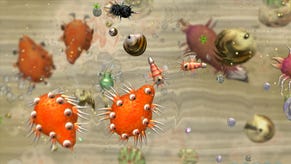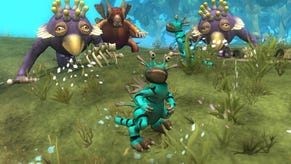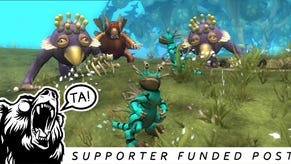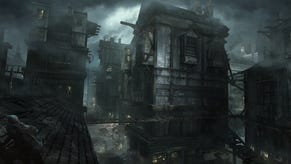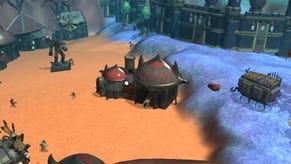The 12 Games of Christmas: Spore
What's that on the horizon? A storm of controversy, you say? Better batten down the hatches and man the lighthouse, we got some dark times ahead.
For the seventh game of Christmas, my true blog gave to me…
Jim:
Spore felt like a tutorial for gaming generally, rather than a game in its own right. The first bit was simple to understand, easy to beat, but nevertheless pretty and over fast - like so many simple, casual games. The second bit required a bit more input, with camera controls at hand, some minigames thrown in, and required use of a mini-map. You had to learn the rules of the game before you could beat it, and that required some experimentation and exploration: fundamental lessons in how to play games. The third bit, well, I don't really know what was going on there, aside from some kind of abstract notion of levelling up, and the idea of commanding multiple entities. The fourth part was the classic resource management and rock, paper, tankbusters of the real time strategy - a battleground upon which many gamer's imaginations are won or lost. Lessons there include use of maps to judge tactics, realising that most techniques add up to the same outcome, and so on. All PC games basically rely on terrain, would be the Ste Curran intepretation of part four.
The fifth and final section, set in space, taught us the most profound lessons about games: that they are essentially limitless in scope, that they can often be bent to reflect your own personality in play, that they are often frustrating and unfair, that the often focus illogically on a single player character, and that you probably won't finish most of them. I didn't finish Spore, and I don't suppose I ever will.
So yeah. I've banged on about various aspects of the game before, but the one lesson it might teach a newbie is perhaps the one that isn't true of gaming at large: that it facilitates and expresses personal creativity, propping up even a profound lack of talent with artistic tools that are almost unbreakable. I am talking about Spore's many editing suites, which caused an explosion of bug-eyed beasts, teapot spacecraft, and houses that looked like scary clowns. Very few games are capable of such creative cleverness, and I can only feel sorry for the person who starts their gaming career playing Spore and LittleBigPlanet, and then goes off looking for similarly accessible computerised-Blue Peter experiences in the rest of gaming.
Spore wasn't quite what we expected, or what we wanted, and it was a little like receiving a Christmas stocking full of bizarre, unwanted gifts that were probably meant for someone else. It was fascinating to rifle through and examine, even if its contents weren't going to be pawed over, hugged, and then mounted on the mantelpiece of gaming nostalgia where we keep all our most treasured experiences. Not everything that is good for you also tastes great. Spore was a slightly salty, doughy collection of highly-nutritious, interesting ideas, and therefore valuable, even if the game proved to have little longevity in our gaming diet.
Kieron:
I feel as if I've written so much about Spore, I don't really know where to start without repeating myself. I was the one who ended up writing most... well, in defence of the game. My real urge was to make sure people understood it. I wanted people to hate it for the right reasons. When I described it as 4-hours of training sequences before becoming Space Rangers 2... well, you'll note that I didn't actually say that you'd like it. I was just trying to make sure people got how it worked. Four opening missions to give you a chance to build your content and learn the conceptual roots of the game, lasting about 4 hours, and then a mass of doing stuff in Space. As I'm sure he'll say, Alec logged up over 50 hours in the game. That's big.
So, yeah, it wasn't perfect. And no, it didn't live up to the hype. And its oversights were somewhat bizarre: I'm genuinely bewildered how a game that tried to be as friendly as it was then threw something as brutal as the constant-attack alien race at you. And I think expectations hurt it in another way - I mean, Will Wright hasn't done a gamers-game since... maybe even the first Sim City. That it had its eye on a more playful, less game-like goal probably shouldn't be a surprise.
I dunno. I've said so much. That I'm repeating "I've said so much" says everything.
I think Jim has an interesting point. I wonder what people who are being introduced to games - and Spore actually makes a great potted history of games in its 5 stages - via Spore are going to be like. Their priorities, their expectations, their desires are going to be warped as much as early experience with D&D changed a previous generation. We're all echoes of the past, y'know? And, flipping the coin, I wonder what those who were made furious by Spore are going to do. Response art is fascinating. The first game which dares to take up the banner of those who were disappointed in Spore has a ready-made rent-a-mob.
C'mon. Someone. I think we can evolve this evolution game. I'd like it that Spore, rather than the ultimate game we dreamed it to be, was actually more alpha than omega.
Alec:
We were arguing softly about the nature and appeal of exploration games the other day, with Jim and John expressing a desire for something like total openness and Kieron and myself feeling some sort of central goal is important if you’re to connect to the game world. Spore’s space stage is something of a paradigm for the latter argument. I lost, as Kieron told you I was going to tell you, a good 50 hours to that stage alone (I suspect the other stages combined barely scraped double figures, by contrast), and that wouldn’t have happened if I was just bumbling around idly colonising planets and abducting penisbeasts. I carved a slow, agreeably arduous and definitely meandering path across space, driven by, but not restricted too, three goals. The universe was mine to roam - but I craved some sort of prescribed achievement and reward. Spore does that well.
Number one: to get all the toys. This meant an economic loop of cash-generation, purposeful exploration and incremental planet-upgrades, each trading circuit expanding my universal remit slightly but generally keeping me within a prescribed area.
Number two: to keep the Grox, Spore’s unavoidably antagonistic baddie race at bay. Or better yet, to destroy the angry little blighters. To achieve the latter, I suspect my 50 hours would have to be more like 100, and I have far too many words to write and cats to feed for such an odyssey. I’m not sure how the recent patches have affected Groxian behaviour, but I had mixed feelings about their role in v1.0. On the one hand, the fact they’re so aggressive and can so casually decimate half your empire is simply absurd, given the number of compromises the earlier stages make in the name of appealing to as broad an audience as possible. On the other – well, there’s that sense of purpose I was on about. I fell into this hugely absorbing cycle of simultaneously expanding, defending and attacking, with planets themselves becoming the game’s key resource.
I strove for and found balance, a rythm of conquest and terraforming that meant I was gaining just enough new colonies that my overall empire was growing despite the trickling losses to Grox invaders. I could never beat them – but I did manage to reduce them from mood-breaking menace to minor annoyance. Spore’s space stage is ultimately a quest to become god – and once I was teetering on the brink of divinity, the infinite Grox horde seemed like little more than bad-tempered ants. In other words, I managed to best the game’s best attempt to destroy my fun, and somehow that makes me like Spore even more.
Number three : to reach the centre. To find God, or a god, or something. Ideally, to do the Star Trek IV thing on whatever it is. This goal required the accomplishment of the first and the second to realistically achieve – accruing enough cash to arm myself so heavily that I could blast a path through Grox space. I achieved this through bizarre hit’n’run guerilla colonisation: taking down as many Grox planets as my health bar would allow, saving the final fraction of it to drop a colony pack on some nearby barren rock, and thus buy myself a restart point close to where I left off come the next death. Frogger with terraforming, basically. It was long and it was bloody, but the cash left by the ruined Grox bases earned me more than trading had. That way, I ceased to worry about the state of my earlier planets. I was obsessed with reaching the centre. By the time I did, I was rich and powerful. What could potential-god possibly give me to improve that?
Well, you’ll know if you ever reached the centre. On the one hand, a let down. On the other, the reward was note-perfect: it was the ultimate celestial power I’d craved. Most of all, it was an ending. Sure, I pottered about for a bit, performing monstrous acts on planets inhabited by friends’ creations, but really I was done. I’d won. I had beaten evolution, I had beaten space, and I had beaten god. I could do anything, go anywhere: by tackling the game’s key but still non-essential goals, I had won the right to the unfettered exploration we all claim to cry for. And lo, I was satisfied.
I can understand anyone being disappointed by Spore, and I’ve got a good half dozen reasons to deliberately spill Johnson, Bradshaw et al’s pint should I ever meet them. How anybody could call it a failure, though, is absolutely beyond me.
(As a final note, I just gunned up my review copy of the game to have a quick nose at the most recent patch. Turned out it’s expired. FU EA. F U! Etc.)





